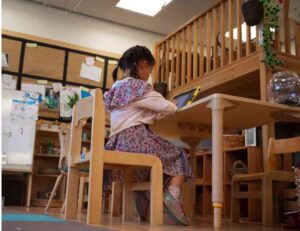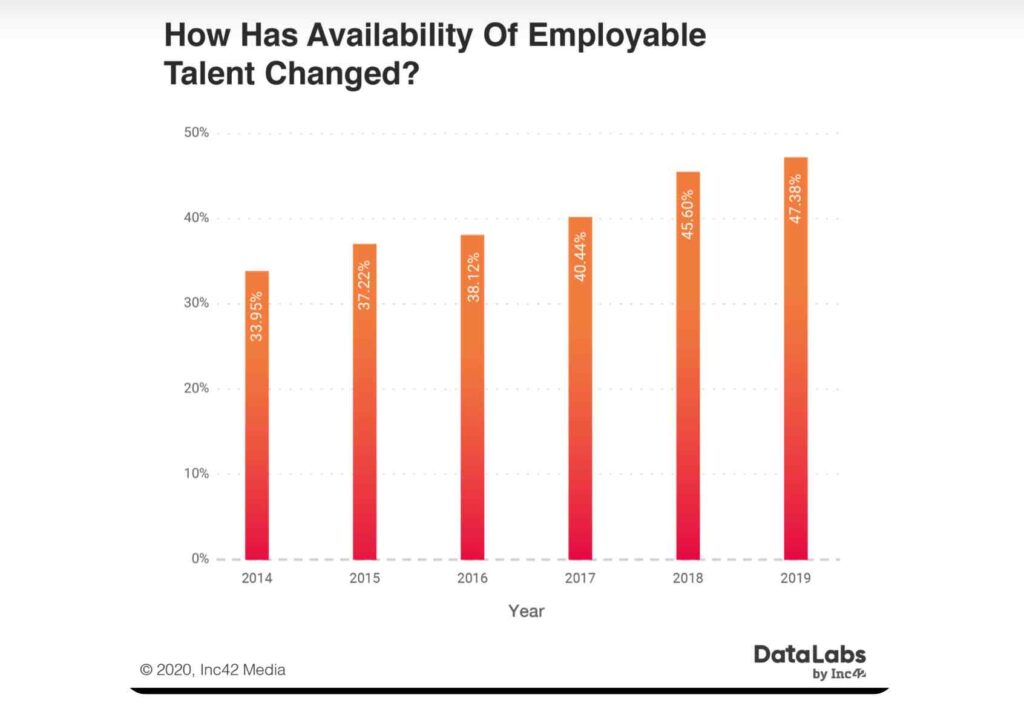by Elias Moses
“The future of education is online” is a foregone statement with Covid-19. Online education is here to stay.
The question that we need to ask is, “does online education have a chance to significantly better society or provide a mere alternative to man’s immobility due to the pandemic? Is it going to be the way next or one of the ways out from the rest?”
 The pandemic would have forced us into the situation with an option of ‘no turning-back.’ But let us acknowledge the fact that online learning has emerged as a significant form of learning in the last two decades.
The pandemic would have forced us into the situation with an option of ‘no turning-back.’ But let us acknowledge the fact that online learning has emerged as a significant form of learning in the last two decades.
I had been a personal beneficiary of it, when I had the privilege of accessing and increasing my knowledge from hundreds of online programs in Mylearning Tool at accenture way back in early 2000, not at the cost of academic learning though.
Academic learning has built the person I am today and online learning has helped me excel and be productive in my career and growth.
This Trend is our Friend
The rising trend in online education has been gathering steam for some time with Covid-19, as it has forced everyone out of classrooms.
The Irony is that this is happening at all levels of education—primary, secondary, post-secondary, professional, certificate, and informal.
Online learning as one of the primary mode of education is here to stay.
According to survey conducted by localCircles across 204 districts in India, 64% of parents are in favour of online classes in schools as against 31 % wanting a ban on them. This is a favourable number in my opinion.
There have been some significant growth in online courses on platforms such as Linkedin Learning, Udemy, Skillshare, Learndash. Blackboard learn, Lectra Inspire, Articulate 360, Elucidat etc…
But in this pandemic situation, as learning has to go on, there are plethora of tools, platforms out there to aid the teaching fraternity in India. Zoom, Microsoft team are predominantly used by schools for virtual learning, and Loom for recorded sessions.
And the general trends in massive online open courses and simultaneous massive online courses have been growing for a long time. But, of course, there hasn’t just been much of growth in informal education.
In truth, all of these courses are likely to grow.
These trends tend to build speedily and then accelerate at certain threshold moments.
Unlike the last decade, the technology is better today. With fibre network, the speed is fast and learning is made available at the comfort of our homes. Everything people need to be most successful is made available with online learning today.
Moving away from the ‘Guild System’
Is the new replacing the old?
‘The guild system’ in our academic education has been the darling of society till date, an academic structure that we have inherited from colonial rule. 
The entire model of doing a bachelor’s degree, master’s degree, and Ph.D. is based on this guild system; and it’s modelled on the medieval structure of apprentice, journeyman and master.
The basic apprehension is whether this guild system is slowly loosing its overall significance with nature imposed pandemic Covid-19, and with arrival of online platform of learning aiming at professional and skill development.
Our schoolite, collegiate, and post-collegiate levels of learning (guild system) are fast seeming irrelevant though irreplaceable structurally.
Historically, that guild structure has often been a barrier to the entry for many careers, skill based and disciplinary forms of learning. I, myself had been an advocate of the latter in the recent past, but not replacing the old with new.
Online education has tremendous potential to disrupt traditional studies and the guild of the academy by drastically expanding the reach of course materials and education content. I expect this is what we’re going to see at an accelerated pace in the years to come. More people will be educated than ever before online—and in total, because of online education
The three trends that will revolutionise online learning are —cost disintermediation, democratisation, and improved user experience. These three drivers will impact the future of academic education too.
1. Cost Disintermediation
First we need to understand what is disintermediation. It is ‘reduction or elimination of the use of intermediaries between producers and consumers.’
What significant connection does it have with our education guild system?
Let me explain. Across countries, education costs have greatly outstripped other costs in the world.
For families, the costs of education of their children weigh far greater than the cost of home. With our guild educational system becoming marginally obsolete and highly expensive, and too, with many intermediaries making their due-cuts from LKG to PG courses, the online platform of learning has come as a forced alternative. It has removed the intermediary costs, which the public will see as a boon in times to come.
More than that, other forms of fees such as capitation fees, development fees, professional fee structures will come under serious reconsiderations, with online platforms becoming an alternative going forward.
2. Democratisation in Learning
What do I mean by democratisation of learning is the “the ability of the student or the common man to democratise access with an online platform and educate more people.”
India’s working-age and student population is estimated to grow beyond 600 million in the next couple of years. According to Datalabs by Inc42, less than half of the tech workforce in India has employable skills.
 What the world today requires is the skilled workforce. Many Service and Manufacturing sectors raise a major concern that the present bunch of work force passing out of colleges are not skilled for modern day business requirements.
What the world today requires is the skilled workforce. Many Service and Manufacturing sectors raise a major concern that the present bunch of work force passing out of colleges are not skilled for modern day business requirements.
Further, there is scarcity of seats for significant courses, and eligible candidates loose out their places on account of fewer number of seats and intermediations.
Apart from academic qualifications, the world of business today looks for apt skills and customised learning for growth and productivity, which the online platform will be able complement and support in near future.
Online certified platforms offer these variety of certified courses that will democratise choices people make with regard to choosing their careers and professions.
This democratisation will lead to diversification of choices and skills capitalising on diversified opportunities.
India as a nation with a population 1.3 billion will be able to make multi-faced approach to developing skills for growth and development, which are lacking in the current situation.
3. Improved User Experience
There is no doubt that digital transformation, connected campuses, user experience, online blended learning are now ‘new normal’ in the Indian education sector.

According to Pearson study, 66% of adult leaners prefer online education indicating growth in demand for online courses.
Today, students and budding professionals are looking for platforms that yield high user friendly experiences that are compatible with their life, career and life-style.
Online platform of learning gives that improved user experience, because
- It is flexible
- It offers wide range of programs
- It is accessible
- It allows customised learning experience
- It is cost effective
Blended Learning – is a way into the future
Humankind has faced and is facing unprecedented revolutions. All our old stories and edifices of learning are crumbling, but no new story or edifice of learning has so far emerged to replace them.
How can we prepare ourselves and our children for a world of such unprecedented transformations and radical uncertainties?
 Just as the digital money can not be a complete replacement for currency notes, so too, online platforms of learning cannot be a substitute/replacement for academic learning. A virtual or an augmented experience cannot replace human experience in a classroom learning.
Just as the digital money can not be a complete replacement for currency notes, so too, online platforms of learning cannot be a substitute/replacement for academic learning. A virtual or an augmented experience cannot replace human experience in a classroom learning.
This is what I heard from a well qualified teacher from a reputed school, who is teaching the students online for the last three months,
“With the current scenario, online Learning is inevitable. Students and teachers are trying to get accustomed to it. All this in the hope that it’s temporary.
Learning happens effectively with face to face interaction. A student remembers the subject and content based on how it is taught more than what is taught. Peer learning, collaboration, social skills development etc happen well in a classroom environment.”
In my view, both modes of learning need to complement each other.
While India is making its headway in digitisation of education, blended learning has to be the key. Rightly so, blended learning is gaining pace with the Indian learners and professionals, which is a whopping 49% in preference.
Our universities and colleges have to adapt to the new age of learning, which comprises virtual/augmented and personal (face to face/traditional) education. The blended form of learning must complement and not contradict, with a firm focus on making our students into a well-round educated and professional class and working force for the future.
It is important for our educationists, today, to study difference between both, and consicentize the society on the importance of class-room and online learning as blend and standard forms of learning for the future.
Online learning is a boon, in so far as it complements the existing structural form of academic learning. While one (campus) builds knowledge and character, the other (online) builds skill and professionalism.
Elias Moses is a Senior Business Strategist, Consultant, Researcher, Corporate and Leadership Trainer, Orator, Columnist and an Entrepreneur. He is also the Founder and Managing Director of a growing reality firm in south India. He is also the founder of Managing Next, an Online portal for knowledge share and Management Consulting.
The author can be contacted@
email: elias@managingnext.in, linkedin: www.linkedin.com/in/eliasmoses

One thought on “The future of education is online – a boon or bane”
Very useful, well brought out ideas and opinions for the benefit of the readers; apt thinking and good reading .Glad that the Pandemic has created an opportunity to put your thoughts and ideas together. .Well done! Yes.I agree that Online learning complements the existing structural form of academic learning and that online learning does not replace the structural academic learning. Sharing of your own experience is much appreciated.
Comments are closed.